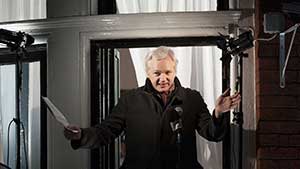Micro-budget filmmakers are allowed to hate you.
Well, not you specifically, but what you represent. After working for free, calling in a million favours and stretching every last dime they raised (and then some), a lucky filmmaker might earn a small commission to actually release their passion project. The catch is that it's usually just enough to cover your famous errors and omissions insurance. Distributors require this liability protection against the unauthorized use of titles, formats, characters, ideas, or other potential lawsuits against defamations of character, breaches of contract or invasions of privacy.
You have to admit: in the age of WikiLeaks, this all seems rather hilarious.
Only a few years ago, a rabble rousing Aussie named Julian Assange almost single-handedly convinced millions of people to throw up their middle fingers at everything you stand for. And yet here you are, working for a film about him. It's almost as ironic as the story of WikiLeaks itself.
According to Oscar-winning director Alex Gibney (and this very slick, non-low budget documentary film), the legend of Assange begins in 1989. A group of Australian hackers, for which Assange was part of (sorry, _allegedly _part of - we need to cover those legal bases), attacked NASA programmers with the WANK worm. It's not as disgusting as it sounds - basically, just a self-replicating computer virus used to show off their hacking skills and promote an anti-nuclear agenda. Still, pretty scary stuff when lives are on the line during a shuttle launch.
Fast-forward to Iceland in 2006 and the creation a WikiLeaks - the infamous whistleblowing website used to publish internal and classified documents. Through a collection of archival footage and home videos, Gibney provides an impressive-looking but sometimes slowly paced portrait of one of the 21st century's most controversial figures. The storyline of the film, much like that of the WikiLeaks website, is impossible to separate from Assange himself. It is told through interviews with security experts, people once in Assange's inner circle, and Gibney's own voiceover. Assange himself did not participate,requesting a $1 million appearance fee to be in the film. Apparently, he doesn't realize how many documents on him already exist and can be exploited without his consent…
I know. You're allowed to laugh when he calls you threatening a lawsuit.
So does the film contain erroneous claims about Assange? Maybe. Does his omission hurt the final film? A bit, but it also feels appropriate. The hypocrisy, and brilliant strategy, of the government simply targeting Assange and not the major news networks who published the same documents is well articulated by others. Bradley Manning, the arrested U.S. solider who actually accessed the original major military documents, is also absent (for more sympathetic reasons) and only given voice through his old chat messages. This, however, allows us to build a compassionate and tragic story around him - arguably, one that's even more compelling than Assange's.
Plus, for those infamous "legal reasons", we know Assange wouldn't have addressed certain issues anyway, including the (strange) sexual assault charges which have clouded his entire WikiLeaks mission. But that's okay. I rather like the amateur theory floated his friend - that Assange, the vagrant father of four children to four different women, has a deep psychological need to plan his "roots" somewhere; hence the unprotected sex stories. Like The Social Network's central premise that Mark Zuckerberg was a social misfit who created Facebook to be accepted, Assange's personal legacy is now in the hands of others to piece together from whatever they can dig up.
Transparency isn't so easy after all, is it?
Saving up for my own legal fees,
Christopher







